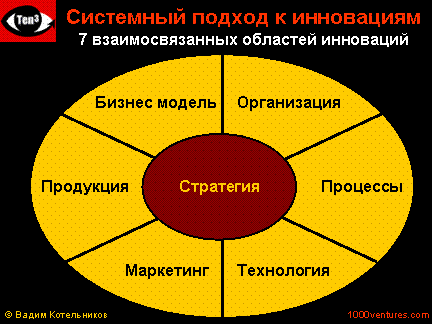|
Managing Innovation |
by Vadim Kotelnikov, Founder, The first-ever BUSINESS e-COACH for Innovative Leaders, 1000ventures.com
"Every organization - not just business - needs one core competence: innovation" - Peter Drucker
|
|
Innovation is the conversion of new knowledge into new products and services. Innovation is about creating value and increasing productivity, and therefore growing your business. Success in business doesn't come from feeling comfortable. With many markets becoming more and more competitive as a result of new competitors from global or deregulated markets, those who innovate best will win in the future. You need to accept risk, measure performance, and embrace innovation. In today's technology-driven world, business life cycles have accelerated exponentially, but good innovation management basics always apply. The challenge is to keep a step ahead of changing market conditions, new technologies and human resources issues. To remain competitive, today's companies need to do more than simply deliver products or services that are better or cheaper than those of their rivals. They must also add features, improve performance, and reduce prices more quickly. They must be faster to launch new lines. To grow, they may need to create entirely new markets and develop venture strategies. Specific Mindset and Skill Requirements Innovation demands a different set of management/leadership skills and processes than those required for managing an existing set of operations. Every manager needs to learn how to lead, nurture, and manage innovation. Growing from within through the creation of new processes, products and services is fundamental, because all other growth strategies depend on the capabilities that successful internal growth provides. Growth through innovation reinvigorates your company. Innovation is not a one-off event, but a continuous response to changing circumstances. Sustainable innovation system doesn't not just help to solve a problem but creates a new capacity, opening up opportunities for further innovation. It's leadership that makes the innovation process work. Innovation, new business creation, and venture investing are durable corporate strategies of the market leaders. New Era of Systemic Innovation Innovation used to be a linear trajectory from new knowledge to new product. Now innovation now is neither singular nor linear, but systemic. It has different forms. It arises from complex interactions between many individuals, organizations and environmental factors. Innovation is not divisible ¢ ægood in partsÆ is no good at all...More Case in Point: Innovation Management Techniques (IMTs) European business needs to adapt if it is to compete in an increasingly knowledge-driven global economy. A Spanish-led consortium aims to help firms by using an analysis of innovation management techniques based on relational tools that promote the diffusion of novel ideas and technologies...More Case in Point: General Electric (GE) "You have just got to constantly focus on innovation. And more competitors. You've got to constantly produce more for less through intellectual capital. Shun the incremental, and look for the quantum leap.", advised Jack Welch, the former legendary CEO of GE, everybody in the company. Now the fundamentals have got to be more education. More information knowledge, faster speeds, more technology across the board...More
|








